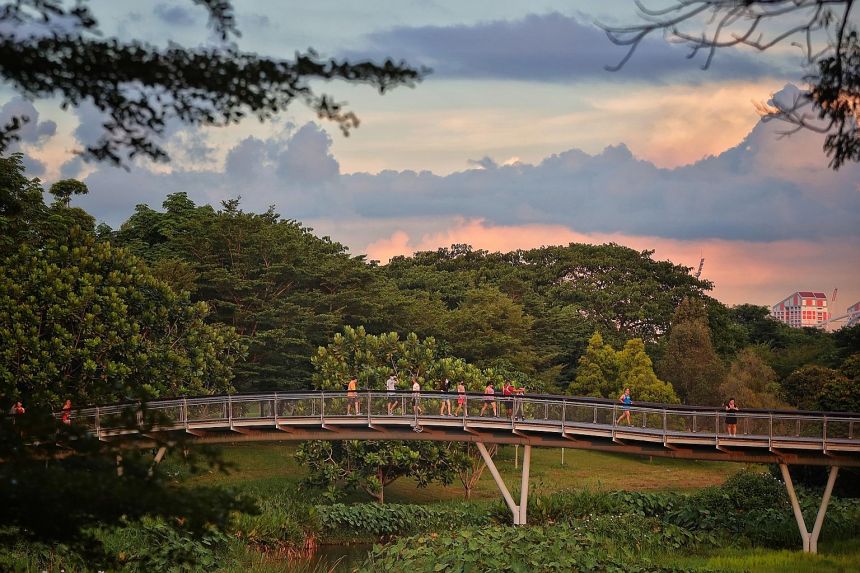Resilient and sustainable infrastructure is also about reducing inequality: Indranee Rajah
Sign up now: Get ST's newsletters delivered to your inbox

Singapore's efforts to provide basic infrastructure include aiming for every household to be within a 10-minute walk of a park by 2030.
ST PHOTO: JASON QUAH
SINGAPORE - Cities need to build infrastructure not only to withstand climate change and pandemics, but also to reduce inequality and strengthen society's resilience, said Minister in the Prime Minister's Office Indranee Rajah.
This is because it is the more vulnerable who often bear the brunt of disruptions and shocks, she said. Infrastructure investments are also critical to providing basic needs, and are a key driver of economic recovery and long-term growth.
She was speaking at the World Cities Summit on Monday (June 21) on the topic, "Investing in a sustainable and equitable recovery".
The biennial summit, held virtually this year because of Covid-19, brings together government leaders and industry to address urban challenges and share solutions. It ends on Wednesday.
Ms Indranee, who is also Second Minister for Finance and National Development, said that around the world, those hardest hit by Covid-19 live in cramped conditions with inadequate sanitation, which worsened the spread of the virus.
Urban infrastructure and systems such as public transport, healthcare, parks and recreational amenities, as well as digital and Internet access, are examples of basic infrastructure that cities must not neglect, she said. "Widening access to these is critical to reducing inequality."
Singapore's efforts in this area, she added, include aiming for every household to be within a 10-minute walk of a park by 2030, and expanding the rail network from 230km to 360km to improve public transport access across the island.
It is also boosting digital literacy among the elderly, with programmes teaching them how to make video calls, search for information online, and protect themselves from scams.
Ms Indranee noted that according to Global Infrastructure Outlook, a Group of 20 (G-20) initiative, the world's infrastructure investment gap will widen to at least US$15 trillion (S$20 trillion) by 2040.
The World Bank has estimated that 85 per cent of the investment gap in sustainable infrastructure will have to come from the private sector.
With Covid-19 straining government budgets, one option is to have investors join governments in public-private partnerships, Ms Indranee said.
Aside from cost savings, these partnerships have other benefits, such as injecting fresh ideas and innovation, and reducing project completion times.
It need not be the case that developers will put profit ahead of public interest, she said, if governments work with the private sector to design and structure their partnership well.
For example, the Urban Redevelopment Authority sets requirements on public spaces and the provision of greenery through various schemes. "This approach sees government providing the planning parameters, while working with the private sector to operationalise them."
Investing in a sustainable and green future is also important, she said.
Climate change, in particular, is the collective challenge of this generation and will impact the world environmentally, socially and economically. Others include growing inequality, ageing populations, pandemics and technological disruptions.
"Infrastructure that integrates these considerations will not only boost resilience, it will, in tandem, also enhance liveability, help create jobs, and drive inclusive growth."
She cited examples of Singapore's investments in sustainable infrastructure, such as car-free town centres and smart features in homes, as well as its goal to become a zero-waste nation and plant one million more trees over the next 10 years. It also plans to install solar panels on 70 per cent of public housing blocks by 2030.
In a panel discussion moderated by Infrastructure Asia executive director Seth Tan, International Finance Corporation Asia and Pacific vice-president Alfonso Garcia Mora said it is important to create a framework for cities to borrow responsibly, such as by issuing bonds. "We also need standards, capacity, incentives, and budget prioritisation that allows a city to think long term."
DBS Bank's group head of institutional banking Tan Su Shan said there needs to be greater clarity in defining what sustainable infrastructure means, as well as flexibility and speed in implementing projects.
"Hopefully, with more multilateral cooperation, we can speed up the process and bring (more) liquidity, transparency and consistency to it," she said.
Other panellists included Jakarta Governor Anies Baswedan, and Mr Gareth Wong, chief executive of Mitbana, a joint venture company of Mitsubishi Corporation and Surbana Jurong.
Elaborating on the theme of resilience, Ms Indranee said that partnering the private sector for infrastructure investment, pursuing a sustainable vision, and ensuring a recovery that leaves no one behind, are closely intertwined rather than separate agendas.
"To be resilient in the face of an uncertain future with unpredictable disruptions, cities need to invest in infrastructure that is both sustainable and equitable. Cities that succeed in doing so will be able to not only survive but thrive," she said.


